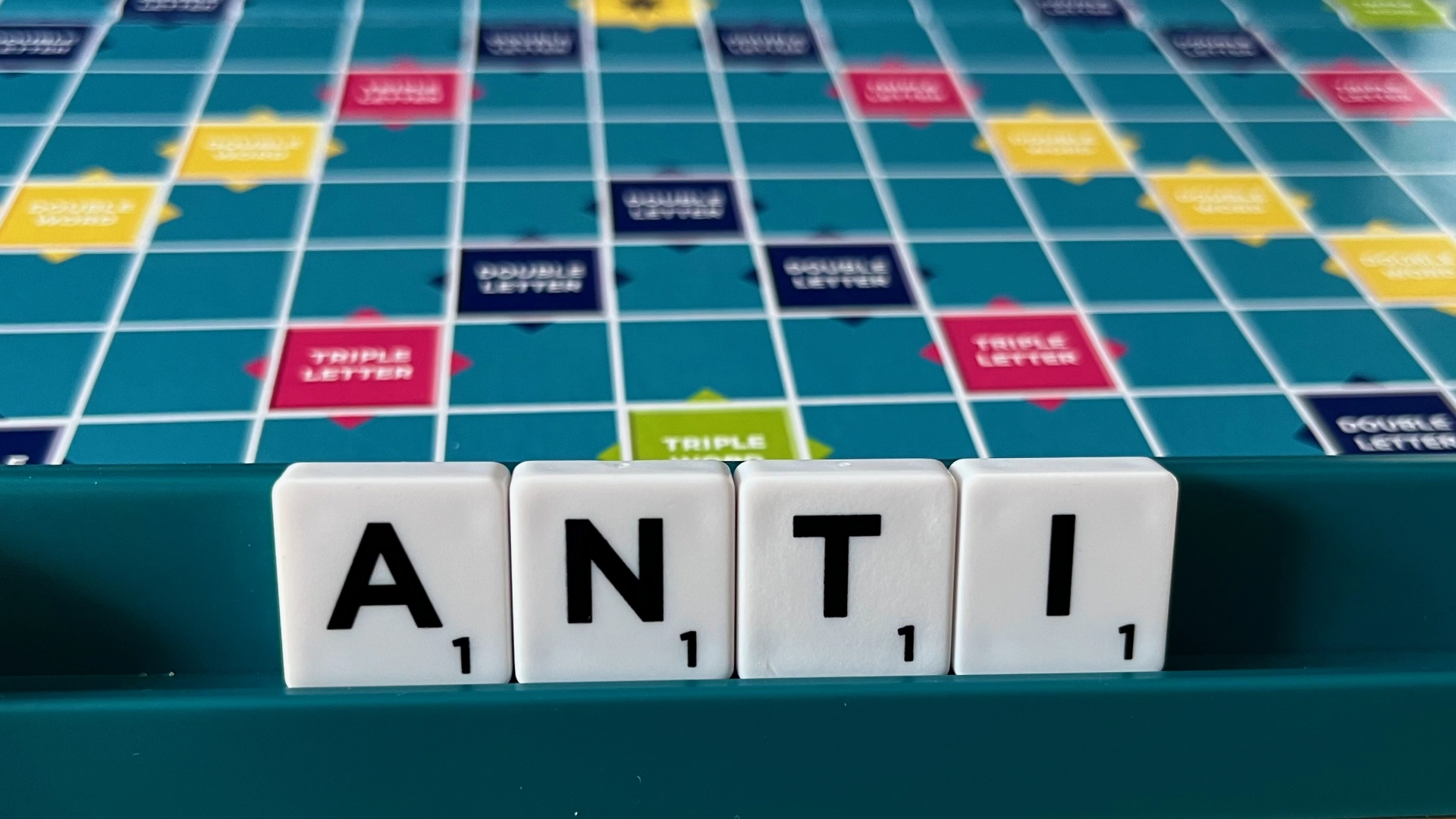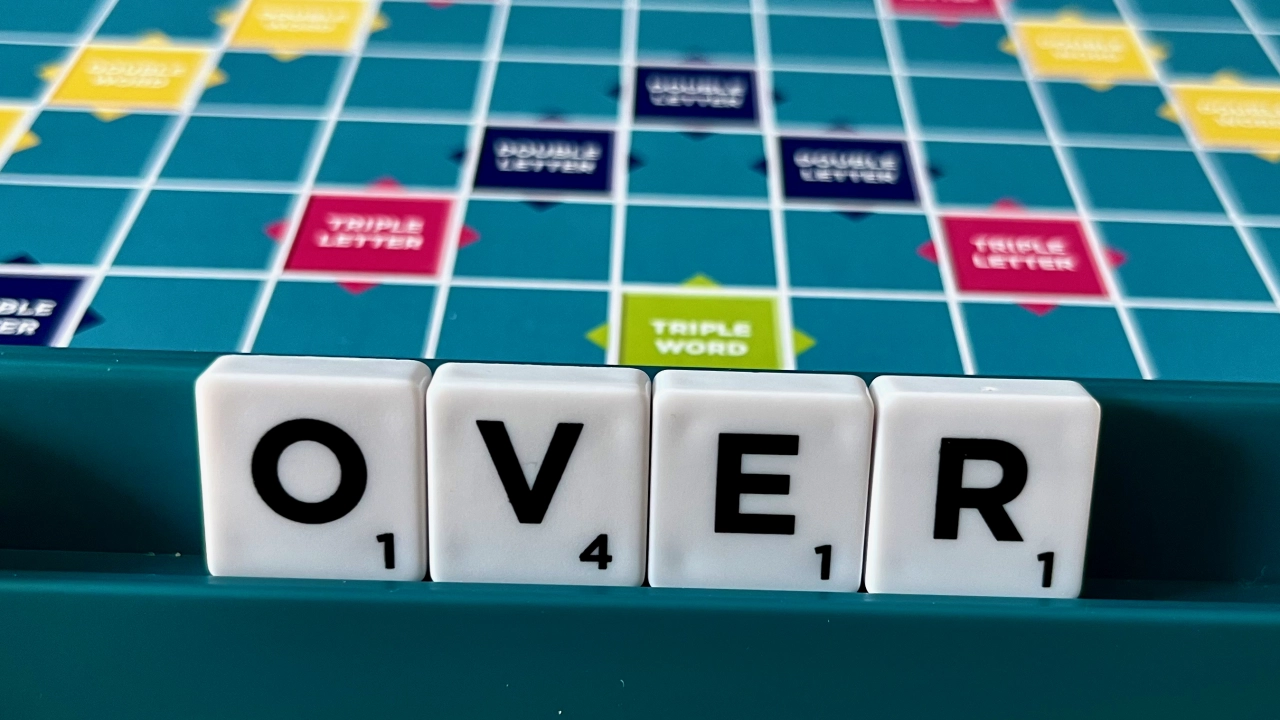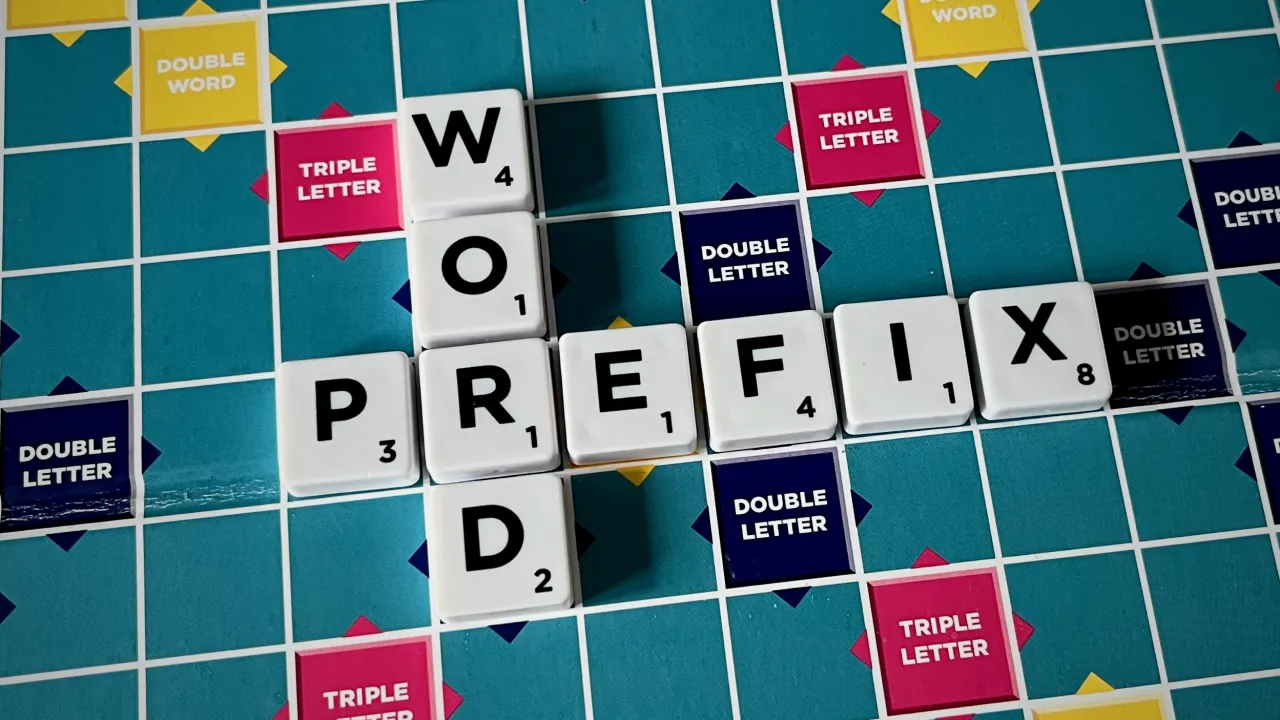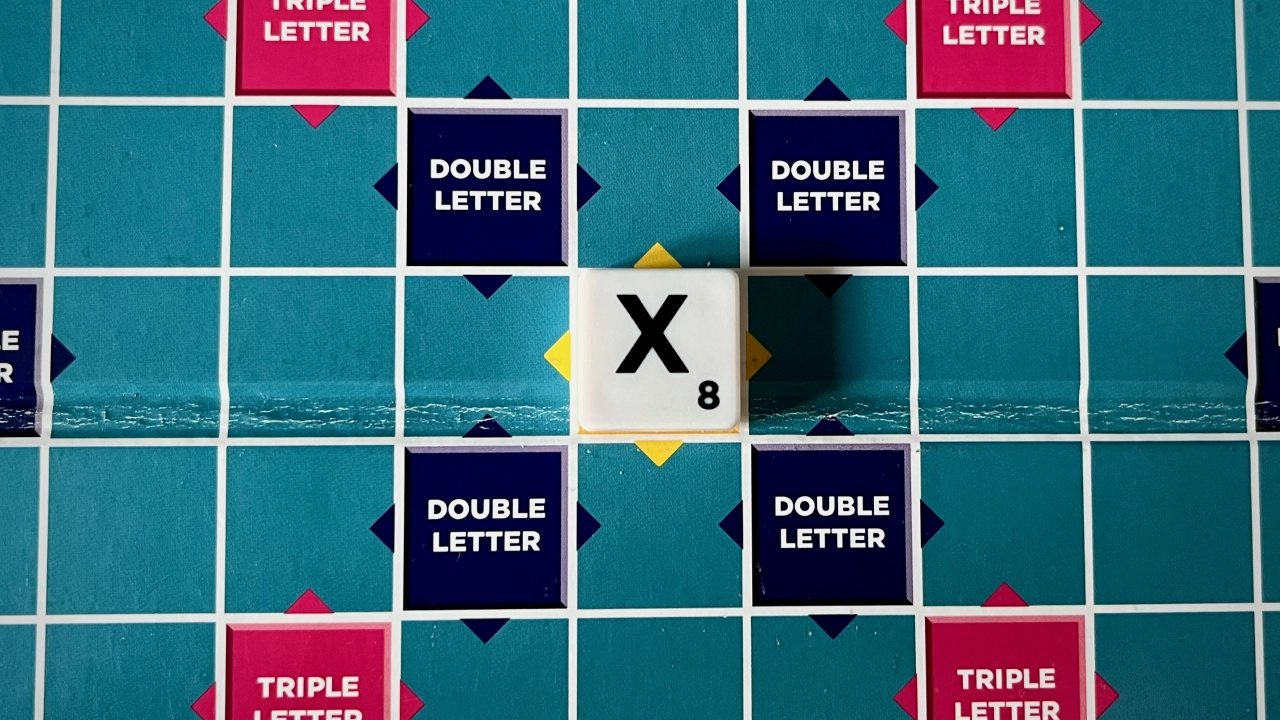Word prefixes are common combinations of letters added to the beginning of words to extend or change their meaning. Knowing how you can utilize prefixes in Scrabble is a great skill to have in your toolkit. Read on to find out more about how prefixes can be used to your advantage.
In this article
- What is a prefix?
- How are prefixes useful in Scrabble?
- Strategies for using prefixes in Scrabble
- Common mistakes with prefixes
- Example Scrabble words with prefixes
- Combining prefixes and suffixes
- How to find more Scrabble prefixes
- Summary
What is a prefix?
A prefix is a letter or set of letters that can be joined on the front of an existing valid word. These additional letters will often add to the words existing meaning or could change the word meaning altogether. Some examples of prefixes include adding “Re” to the front of “Turn” to make “Return” or adding “Under” to the beginning of “Water” to create “Underwater”. In both these cases, we’ve added a combination of letters to the start of a word to create a new one. The majority of prefixes that can be used are derivational - this means they create an entirely new word with a different meaning from the original word.
How are prefixes useful in Scrabble?
Prefixes have two main uses when playing Scrabble. Firstly, they can be used as a way to extend existing words that have been played on the board, and secondly, they can be handy for playing longer words. This unlocks new opportunities for creating great scoring words or even more easily playing bingos as we’ll discuss below.
Strategies for using prefixes in Scrabble
Using prefixes to extend words
One of the many ways to score points in Scrabble is by hooking onto existing words on the board to make longer, higher scoring new words. Prefixes were practically designed for achieving this as they extend words by adding additional letters to the beginning. By memorizing the most common prefixes in the English language (we’ve listed plenty of examples below to get you started) you’ll be equipped to better visualize these word extensions when playing.
Extending onto multiplier squares
In addition to what we’ve mentioned above about extending words, the real prospect to score points here comes from bonus squares on the game board. Always look out for opportunities when playing to add a prefix to an existing word that would bridge it onto or across a bonus square such as double/triple letters and words. Therefore, not only does the word score more because you’ve made it longer, but the score could be double or tripled too.
Prefixes can be a great way of getting a bingo
Furthermore, look out for bingo opportunities when considering word prefixes. One of our favourite strategies we like to use in games is keeping common word prefixes that are easily extendable such as “re”, “un”, and “en” on our tile rack to the left side when we spot them. Therefore, all we must do is get a 5-letter word (or shorter depending on the prefix) that matches our prefix and BINGO! This tactic makes it super easy to get the correct tiles for a bingo on your rack, however, the tricky part then just becomes getting it out on the board.
Common mistakes with prefixes
One common mistake we often see Scrabble players make is not knowing which prefixes are valid, or thinking prefixes are not allowed entirely. Some prefixes based on the game rules cannot be played as a single word on their own. For example, “pre” cannot be played as a standalone word in the American version of the dictionary. However, “pre” is valid in other dictionaries such as those used in the UK.
As a result, the use of prefixes can be confusing for players when trying to stick to the rules. Our tip to navigate this confusion is to agree on a dictionary or word finder beforehand which can be used during your game to check the validity of the prefixes you wish to play. This removes any question about what is and is not allowed by checking an official source of information. Plus, it helps to prevent any of those little arguments over words.
Example Scrabble words with prefixes
We’ve hand-picked a selection of Scrabble word prefixes and a few of words that have them to help give you some inspiration of what’s possible with prefixes during your next game.
Anti-
Meaning: to be against something or prevent something.
Examples:
- Antibody - a protein that fights infections (8 letters, 14 points).
- Anticity - hostility to city life (8 letters, 13 points).
- Antiquark - a subatomic particle (9 letters, 22 points).
- Antivirus - software that detects and removes computer viruses (9 letters, 12 points).
- Antigen - a substance that provokes an immune response (7 letters, 8 points).
- Anticize - to criticize or oppose (8 letters, 19 points).
Discover all words beginning with “Anti.”

Under-
Meaning: to be below something.
Examples:
- Undersky - refers to the lower region of the sky (8 letters, 16 points).
- Underdog - someone who’s likely to lose; a competitor at a disadvantage (8 letters, 11 points).
- Underpay - to pay a person less than required (8 letters, 14 points).
- Underpass - a path that goes underneath a road or other man-made obstacle (9 letters, 12 points).
- Underfund - to give funding to something less than required (9 letters, 14 points).
- Underwear - a piece of clothing worn under the outside layer of clothes (9 letters, 13 points).
Find every word starting with “Under.”
Re-
Meaning: generally meaning to do something again after a first go; however, “re” can be versatile across contexts.
Examples:
- Rekey - to change the lock or key to something (5 letters, 12 points).
- Remix - create a new version of something from the original; usually used in the music industry to describe alternative versions of songs (5 letters, 14 points).
- Recap - to summarize or go over the main points (5 letters, 9 points).
- Refix - to repair something for a second or more time (5 letters, 15 points).
- Requin - a small shark (6 letters, 15 points).
- Replay - to play something again, e.g., a movie or TV show (6 letters, 11 points).
More words starting with “Re.”
Un-
Meaning: to do the opposite of what has been previously done.
Examples:
- Unmix - to attempt to separate or undo a mixture (5 letters, 14 points).
- Unfed - unnourished; not given enough food (5 letters, 9 points).
- Untax - to remove a tax (5 letters, 12 points).
- Unwise - not wise (6 letters, 9 points).
- Unhook - remove a hook that’s attached to something (6 letters, 13 points).
- Unkept - to look messy or unmaintained (6 letters, 12 points).
All words beginning with “Un.”
Mis-
Meaning: to do something incorrectly.
Examples:
- Miscut - to cut something wrong (6 letters, 10 points).
- Misfit - something not fitting with its surroundings (6 letters, 11 points).
- Misjoin - a join something incorrectly (7 letters, 16 points).
- Misform - to incorrectly form something (7 letters, 14 points).
- Misplace - to put something in the wrong place or to lose something (8 letters, 14 points).
- Misspelt - to spell a word incorrectly (8 letters, 12 points).
List of words starting with “Mis.”
Dis-
Meaning: commonly used in terms of negativity towards someone or something; often involving emotions.
Examples:
- Dismay - a feeling of concern or distress (6 letters, 12 points).
- Discord - lack of harmony; also, the name of a popular online messaging service (7 letters, 11 points).
- Discuss - to talk about something (7 letters, 10 points).
- Disturb - to interrupt someone (7 letters, 10 points).
- Dislike - to show negative feelings and actions towards someone or something (7 letters, 12 points).
- Disgust - profound disapproval towards someone or something (7 letters, 9 points).
Discover all words using the “Dis” prefix.
Ex-
Meaning: most common usage is to mean former, however, again the meaning of “ex” can largely vary across contexts.
Examples:
- Exam - a test of knowledge (4 letters, 13 points).
- Exact - precise, accurate, or correct (5 letters, 14 points).
- Expert - a knowledgeable person in a specific subject (6 letters, 15 points).
- Expiry - end of life for something; could be a product or service (6 letters, 18 points).
- Expect - to think or wait on something to happen (6 letters, 17 points).
- Exclaim - to say something; normally in a loud fashion (7 letters, 18 points).
Every word using the “Ex” prefix.
En-
Meaning: used to represent the doing or coming to the reality of a specific thing.
Examples:
- Enfix - to attach something in a certain place (5 letters, 15 points).
- Enjoy - to get pleasure from doing something (5 letters, 15 points).
- Ensure - to make sure something happens or is done (6 letters, 6 points).
- Entomb - place something or someone in a tomb (6 letters, 10 points).
- Enable - grant the opportunity or means to do or achieve something (6 letters, 8 points).
- Engrain - to make something well established (7 letters, 8 points).
Over-
Meaning: to do too much of something.
Examples:
- Overdo - to do too much (6 letters, 10 points).
- Oversee - to manage something (7 letters, 10 points).
- Overpay - pay someone too much; could be monetary or non-monetary payment (7 letters, 15 points).
- Overdone - overcooked normally past the point of being edible or to do too much of something, e.g., Sarah has overdone the birthday celebrations (8 letters, 12 points).
- Overzeal - excessive zeal (enthusiasm) (8 letters, 20 points).
- Overprice - for the price (cost of buying) something to be too high (9 letters, 16 points).
All words with the prefix “Over.”

Pre-
Meaning: something that happens beforehand.
Examples:
- Prefix - a letter or combination of letters added to the beginning of a word (6 letters, 18 points).
- Preset - to set something in advance (6 letters, 8 points).
- Prefab - something manufactured in advance, such as a prefabricated house (6 letters, 13 points).
- Prepose - to put something in ahead of time (7 letters, 11 points).
- Precook - to cook something ahead of time; usually to be finished cooking at a later stage (7 letters, 15 points).
- Previsit - go somewhere, normally a physical location, ahead of the planned timing; e.g., Ryan previsited the place of his job interview to find the location the day before (8 letters, 13 points).
Discover all words using the “Pre” prefix.
Combining prefixes and suffixes
Prefixes aren’t the only useful strategy you can implement into your Scrabble game, there are also suffixes. A suffix is very similar to a prefix, except instead of being a group of letters that goes before a word, a suffix follows a word. Some examples include “-er”, “-ing”, and “-ful”. We’ve written an in-depth article about Scrabble suffixes here if you wish to find out more on the topic.
A strong Scrabble player will often include both prefixes and suffixes into their game plan. They could even combine the use of both in a single play by hooking letters onto the front and end of a word at the same time. For example, imagine if the word “Fold” had been played by your opponent. Subject to you having the correct letters on your rack, you could add “Un” to the start and “er” to the end, thus creating a new much longer and higher-scoring word “Unfolder”. There are many more cases like this in Scrabble where this strategy can be used. Hopefully, this illustrates the power prefixes and suffixes can unlock during your game.
How to find more Scrabble prefixes
Our online word finder is the perfect tool for searching for Scrabble prefixes you could play. We’d recommend using it in one of two ways to undercover those hidden prefixes:
- If you already know which prefix you want to use, enter the prefix in the “starts with” input and click search. This will search the dictionary for any words beginning with the prefix you’ve entered.
- Alternatively, if you do not know the prefix yet but have words on the board or your tile rack to expand on, enter the existing word you have in the “ends in” section. This will get a list of all the possible prefixes for that word from the dictionary for you.
Summary
Now you’ve learnt all there is to know about Scrabble prefixes, the next step is applying your new knowledge in your next game. Hopefully this leads you down a path for creating great words and securing a winning score. Happy playing all!
Did you find this article helpful?



